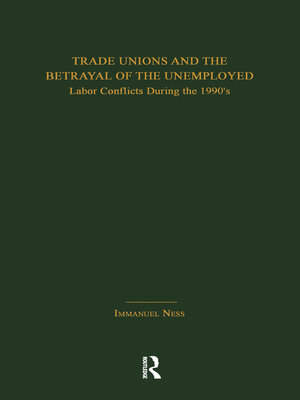Trade Unions and the Betrayal of the Unemployed
ebook ∣ Labor Conflicts During the 1990s · Garland Studies in the History of American Labor
By Immanuel Ness

Sign up to save your library
With an OverDrive account, you can save your favorite libraries for at-a-glance information about availability. Find out more about OverDrive accounts.
Find this title in Libby, the library reading app by OverDrive.



Search for a digital library with this title
Title found at these libraries:
| Library Name | Distance |
|---|---|
| Loading... |
This book examines the problematic relationship between unions and the unemployed in New York City during the 1990's. Historically, trade unions in the U.S. have had an interest in the political mobilization of the jobless to expand unemployment insurance and lessen the threat of lower wages, reduced union density, and weaker bargaining positions for unions. Despite these advantages, trade unions have rarely organized the unemployed, because they represent a potential threat to the organizational control, leadership, and legitimacy of the trade unions themselves. Moreover, the interests of the unemployed conflict directly with those of the securely employed trade unionist.
The study identifies union responses to unemployment at local and regional levels and the responses of independent activist organizations. The research suggests that hiring hall unions produce exclusive organizing strategies that have deeper accountability to their members, but with organizing objectives that serve only the narrow interests of core members. By contrast, workplace-based unions typically engender class-oriented unions with narrow accountability to members, but with organizing objectives that extend beyond their immediate members.







